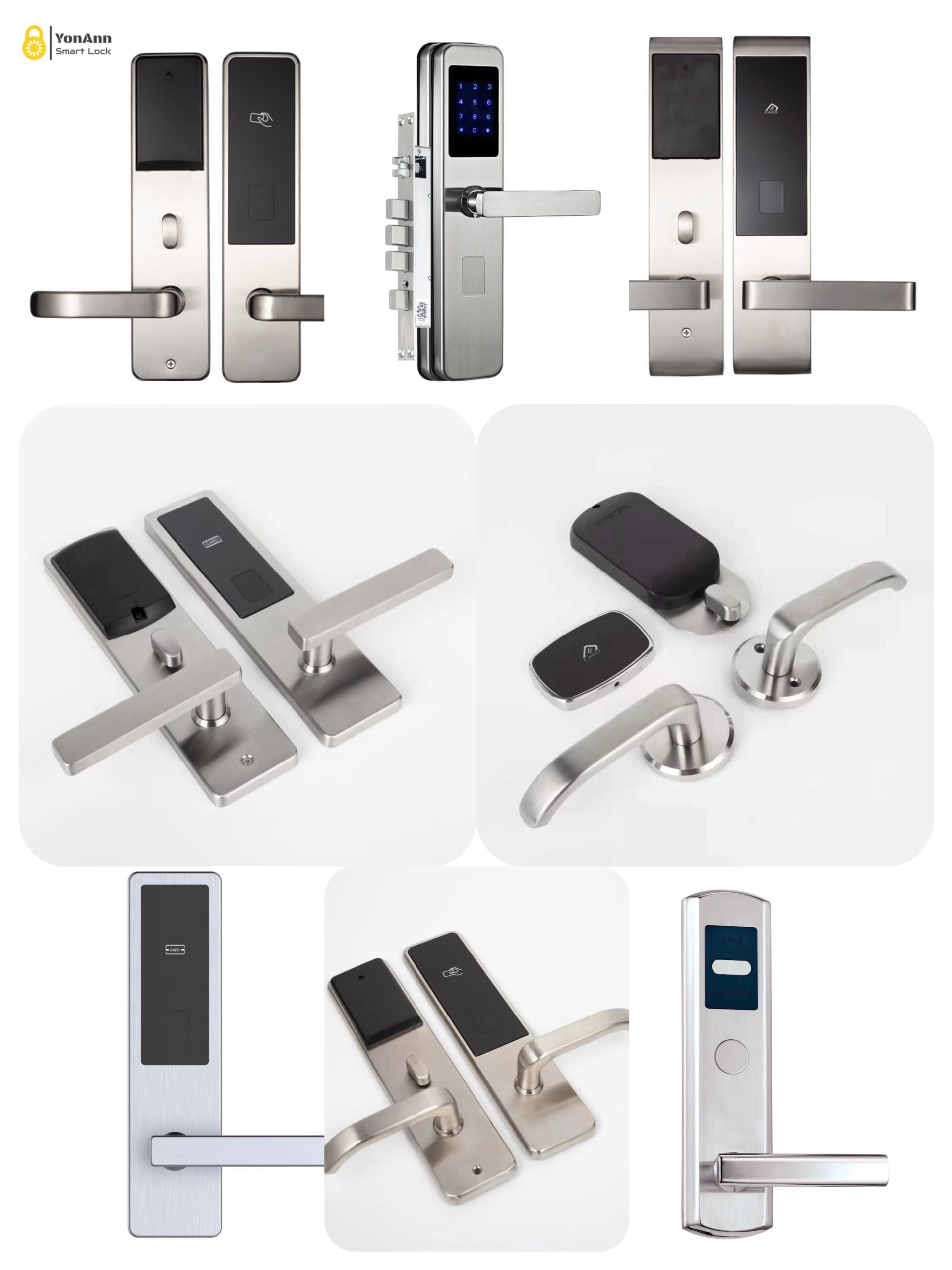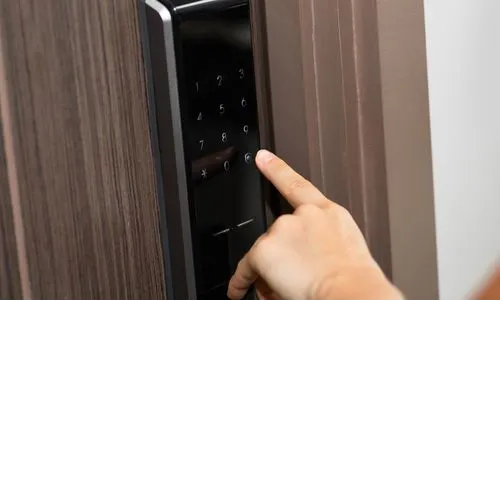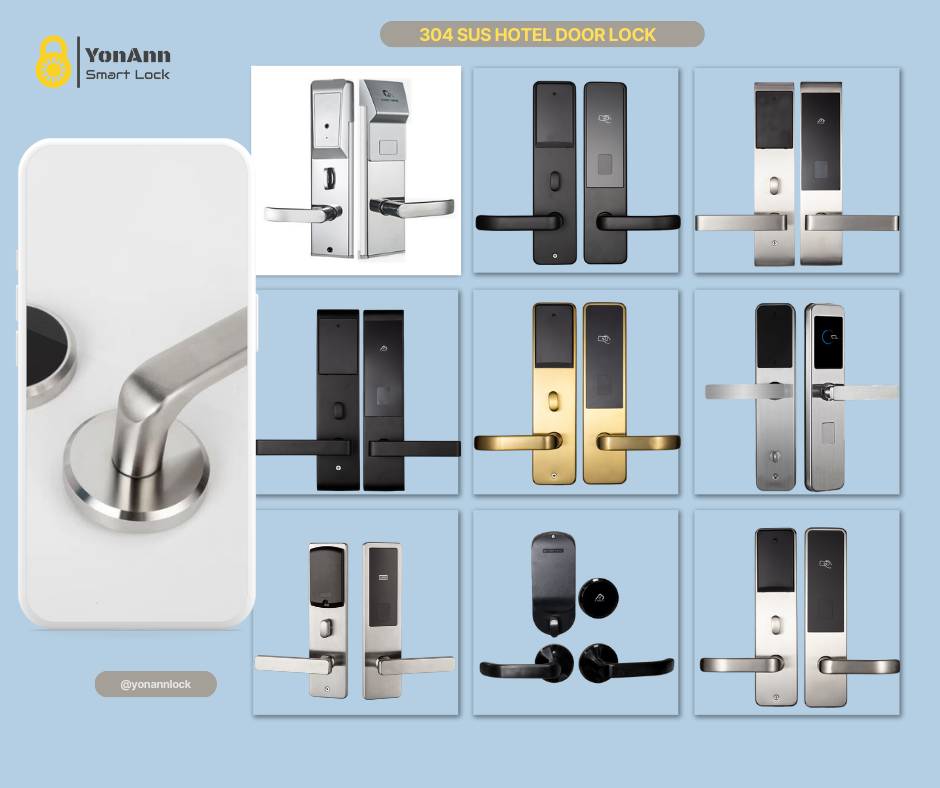How to Choose the Right Hotel Door Lock for Your Hotel?

1. Introduction
When it comes to running a hotel, one of the most important aspects of ensuring both guest safety and satisfaction is choosing the right hotel door lock system. After all, the security of your guests and their belongings is paramount, and the lock on their door plays a crucial role in protecting both. But it’s not just about security—modern hotel door locks also impact guest experience, operational efficiency, and overall hotel management.
As a hotel owner or manager, you may find yourself asking: Which hotel door lock is right for my property? With a wide variety of options available—ranging from traditional mechanical locks to cutting-edge smart locks—it can be overwhelming to know where to start. You want a lock system that meets your hotel’s security needs, fits within your budget, is easy to use for both staff and guests and integrates smoothly with your hotel’s operational systems.
This article is designed to guide you through the process of choosing the best hotel door lock system for your property. We’ll explore the key factors you should consider when making your decision, such as security, guest convenience, cost, and maintenance. We’ll also review the different types of hotel locks available, from RFID hotel locks to smart locks with face recognition, and help you understand which solution works best for your unique needs.
Whether you’re running a small boutique hotel or a large chain, the right hotel door lock can significantly enhance both security and guest satisfaction. By the end of this article, you’ll be equipped with the knowledge you need to choose a lock system that perfectly fits your hotel’s requirements.

2. Key Factors to Consider When Choosing Hotel Door Locks
Choosing the right hotel door lock system isn’t just about picking the most advanced or the cheapest option available. It’s about finding a solution that meets your specific hotel’s needs, offering the right balance between security, convenience, cost, and maintenance. Below are the key factors you should consider before making your decision:
2.1 Security Requirements
The security of your hotel guests is your top priority. When selecting a hotel door lock system, it’s essential to evaluate the level of security provided by each type of lock. Ask yourself: How secure does the system need to be?
-
Traditional Mechanical Locks: While basic and cost-effective, these locks are the least secure. They rely on physical keys, which can easily be lost or copied. If you choose a mechanical lock, ensure that you have a robust key control system in place to mitigate security risks.
-
Electronic and RFID Hotel Locks: These locks offer enhanced security by using electronic keys (keycards or key fobs) or RFID cards that cannot be duplicated easily. Additionally, many RFID locks allow for tracking guest room access, providing a higher level of security.
-
Smart and Bluetooth Locks: These advanced options offer cutting-edge security features, such as encrypted communication and smartphone-based access. For higher-end properties or luxury hotels, integrating a smart lock system can offer guests more security while eliminating the risk of lost or stolen keys.
-
Face Recognition and Biometrics: For the highest security level, biometric systems, like face recognition locks, are becoming increasingly popular in high-end hotels. These systems are almost impossible to hack and offer an additional layer of safety.
2.2 Budget and Cost Considerations
Choosing the best lock system must align with your hotel’s financial situation. However, the initial cost is only part of the equation. Consider the following:
-
Upfront Cost: Traditional mechanical locks are often the most budget-friendly option, but they may incur higher long-term maintenance costs due to wear and tear. Electronic locks or RFID hotel locks tend to be more expensive upfront, but their durability and advanced features could save you money in the long run by reducing key replacements and maintenance issues.
-
Installation Costs: Consider the cost of installation, including labor, and whether your hotel’s existing doors are compatible with your chosen lock system. For instance, Bluetooth and smart locks may require additional infrastructure or changes to your existing door hardware.
-
Ongoing Maintenance: Electronic locks generally require regular battery replacements, and RFID cards can become demagnetized. Smart locks may require software updates and network maintenance. Factor these ongoing costs into your decision-making process.
-
Long-Term Value: Remember that while more expensive locks, such as smart locks or RFID, may have a higher initial price, they can improve the guest experience and reduce operational costs (e.g., fewer lost keys, better guest management), which might make them a more valuable investment over time.
2.3 Guest Experience and Convenience
A seamless guest experience is critical for any hotel. When selecting a hotel door lock system, think about how it will affect both the guests and the hotel staff:
-
Ease of Use: Consider how guests will interact with the lock. Traditional keys may feel familiar to some guests, but they’re often cumbersome and easy to misplace. Electronic keypads and RFID cards provide a more convenient and secure solution, and Bluetooth locks allow guests to unlock doors with their smartphones, making the process effortless.
-
Check-in Process: With modern systems like RFID or smart locks, the check-in process can be automated and more streamlined, allowing for mobile check-ins or keyless room access. This feature can improve the guest experience by reducing wait times and adding an element of tech-savvy convenience.
-
Flexibility for Guests: Some guests may prefer a traditional key, while others might appreciate the high-tech option of a smart lock or QR code entry. Offering multiple lock options can accommodate a wider range of guest preferences.
-
Touchless Options: In today’s world, contactless access is more important than ever. QR code locks, Bluetooth locks, and smart locks can all eliminate the need for guests to physically touch the lock, which is a huge benefit in terms of hygiene and safety.
2.4 Maintenance and Durability
A good hotel door lock system should be durable and require minimal maintenance. However, like any mechanical or electronic system, locks will need regular care to ensure their continued functionality. Consider:
-
Battery Life and Maintenance: Electronic locks (such as keypad or RFID locks) are powered by batteries that will eventually need replacing. Look for a system that alerts hotel staff when the battery is low to avoid inconvenient lockouts.
-
Durability: Locks with metal components or robust designs tend to last longer. Smart locks, for example, are designed to withstand wear and tear and may be more durable than cheaper mechanical locks or basic keypads.
-
Ease of Repair: Choose a system that is easy to repair or replace if something goes wrong. Having a reliable maintenance contract or service plan with the lock supplier is always a good idea.
2.5 Integration with Hotel Management Systems (PMS)
Many hotel door lock systems today can integrate with your Property Management System (PMS) to streamline operations. For example, RFID or smart locks can automatically update room status when a guest checks in or checks out, reducing administrative work for your front desk team.
-
Automation: A system integrated with your PMS allows for seamless communication between the front desk, maintenance, and the lock system itself. Staff will be alerted when a guest enters or exits and room keys can be updated automatically.
-
Real-Time Updates: Integration with the PMS can also help manage inventory and track room occupancy, allowing for quicker turnaround times for housekeeping and more accurate room management.
-
Customization: Some advanced systems allow you to customize access parameters based on guest needs or room type, creating a more personalized guest experience while maintaining high levels of security.
2.6 Scalability
Consider the future of your hotel when choosing a lock system. Will you be expanding? Upgrading to new technology down the line? Choose a system that’s easy to scale up or integrate with future innovations.
-
Modular Systems: Some systems, like RFID or smart locks, offer modular designs that can be added to as your hotel grows. This flexibility can be valuable when planning for future expansions or updates to your property.
Conclusion
Choosing the right hotel door lock system requires balancing several important factors—security, budget, guest experience, and maintenance. It’s essential to carefully evaluate your hotel’s unique needs, consider the long-term costs and benefits, and select a lock system that enhances both security and convenience. In the next chapter, we will take a closer look at the different types of hotel door locks available on the market today, so you can make a more informed decision on which one is right for your property.
3. Different Types of Hotel Door Locks
You can refer to our article about hotel door lock types here for more: click here

4: How to Match the Right Hotel Door Lock to Your Property
Choosing the perfect hotel door lock is not a one-size-fits-all decision. The right lock system for your property depends on a variety of factors, including your hotel’s size, type, target guests, and budget. In this chapter, we’ll help you understand how to match the right hotel door lock system to your unique property to ensure security, convenience, and a positive guest experience.
4.1 Consider Your Hotel Type and Size
Different types of hotels have different needs when it comes to door lock systems.
-
Boutique Hotels & Guesthouses These smaller, more personalized properties often prefer a stylish, easy-to-use system. RFID card locks or Bluetooth smart locks are ideal here. They are sleek, modern, and offer a good mix of security and technology without overwhelming guests or staff.
-
Mid-Range Hotels For medium-sized hotels, balancing cost and functionality is key. RFID hotel locks are a popular choice because they are affordable, reliable, and can integrate well with most PMS systems.
-
Luxury Hotels and Resorts In high-end properties, guest expectations are higher. Advanced systems like face recognition door locks, mobile app-based locks, or QR code hotel locks offer seamless, contactless access while showcasing innovation and security.
-
Chain Hotels or Multi-Location Properties For large hotels or groups with multiple branches, standardized systems are crucial. Choose locks that integrate easily with PMS and central management software for consistent control and monitoring across all locations.
4.2 Think About Your Guest Profile
The type of guests you attract can also help guide your door lock selection:
-
Business Travelers These guests value speed and efficiency. Consider smart locks with mobile app access, keyless entry, or QR code locks to simplify check-in and room access.
-
Families and Tourists Easy-to-use RFID keycards or keypad locks are great choices for families, offering a balance of simplicity and security.
-
Elderly or Less Tech-Savvy Guests While smart locks are innovative, some guests may prefer traditional keycards or mechanical options. Look for systems that are intuitive and offer flexibility for different comfort levels.
4.3 Evaluate Your Door Structure and Hardware
Before selecting a hotel door lock system, you must confirm whether your existing doors are compatible:
-
Material Compatibility Ensure the lock is designed to work with your door material—wooden, metal, or glass. For example, glass door locks often require special fittings.
-
Door Thickness Each lock model has a compatible door thickness range. Check the technical specifications before ordering.
-
Retrofit or New Installation If you’re replacing old locks, consider whether the new system allows for retrofitting or if you’ll need to modify the door entirely. Some RFID or Bluetooth smart locks are designed for easy upgrades with minimal drilling.
4.4 Match Features to Your Operational Needs
The lock system should also support your day-to-day hotel operations.
-
PMS Integration Choose a lock system that integrates with your hotel’s Property Management System (PMS). This allows for automatic key issuance, guest check-in/out updates, and improved staff coordination.
-
Access Control and Audit trail systems like RFID hotel locks and smart locks offer time-stamped records of door activity. This feature improves security and accountability.
-
Multiple Access Levels Ensure the system allows access management for guests, housekeeping, maintenance, and management roles.
4.5 Branding and Aesthetics
Hotel door locks are part of the guest’s first impression—so design matters.
-
Custom Finishes and Logos Some manufacturers allow for custom branding, including logo engraving or personalized keycards, which adds a professional and cohesive touch to your hotel’s design.
-
Match to Interior Style Whether your design is modern, classic, or minimalist, choose a lock that complements the overall theme of your rooms and hallways.
4.6 Maintenance and Technical Support
No matter how advanced your system is, it must be easy to maintain.
-
Battery Replacement and Alerts Most smart locks operate on batteries. Choose a system with low-battery alerts or centralized monitoring to avoid disruptions.
-
Technical Support and Warranty Work with a supplier who offers reliable technical support, installation guidance, and a clear warranty policy.
Conclusion
Finding the right hotel door lock system requires a thoughtful match between your property’s specific characteristics and the lock’s capabilities. Whether you run a small boutique hotel or a luxury resort, your goal is to provide secure, smooth, and satisfying guest access. By considering hotel type, guest needs, door compatibility, and operational features, you can confidently choose a system that enhances your hotel’s reputation and efficiency.
5: Conclusion
Choosing the right hotel door lock system is one of the most important decisions you’ll make when setting up or upgrading your hotel. It not only impacts the security of your property but also shapes your guests’ first impressions and overall experience.
In this guide, we explored the key factors that should influence your decision, from understanding different lock types like RFID locks, Bluetooth smart locks, QR code locks, and face recognition door locks, to considering your hotel’s size, guest profile, door structure, and operational needs.
Every hotel is unique. A boutique guesthouse may prioritize style and simplicity, while a luxury resort may demand high-tech access solutions integrated with a Property Management System (PMS). By taking the time to evaluate your options carefully, you can ensure that your hotel door lock investment enhances both security and guest satisfaction.
If you’re still unsure about which lock system is right for your hotel, don’t hesitate to reach out to experienced suppliers or solution providers who can offer tailored advice. You can also start by testing sample locks to see what fits best for your doors and workflow.
Remember: A smart door lock solution doesn’t just protect—it creates convenience, efficiency, and a better experience for everyone who walks through your doors.
6: Frequently Asked Questions (FAQs)
When it comes to choosing the best hotel door lock system, many hotel owners and operators have similar questions. Here are answers to the most common ones to help you make confident decisions.
6.1 What is the most secure hotel door lock?
The most secure hotel door locks today combine hardware durability with smart technology. High-security options include:
-
RFID hotel card key locks with anti-copy encryption
-
Bluetooth-enabled smart locks with rolling codes and two-factor authentication
-
Face recognition door locks, which offer biometric access control
-
QR code hotel locks, suitable for contactless and time-sensitive access
Each of these provides high levels of security when installed correctly and integrated with reliable hotel management systems.
6.2 How do I know if my doors are compatible with smart locks?
Before selecting a smart lock, check these factors:
-
Door material: Most locks are compatible with wood or metal doors. Glass doors require specific models.
-
Door thickness: Many locks support 35–60mm door thickness. Always verify specs with your supplier.
-
Mortise type: Ensure the lock’s mortise matches or can replace your current hardware.
Most suppliers will request door measurements and photos to confirm compatibility before shipment.
6.3 Are Bluetooth locks secure?
Yes, modern Bluetooth hotel locks are secure when equipped with:
-
AES encryption
-
Dynamic keys or rolling code systems
-
Compatibility with secure mobile apps (e.g., TTLock)
They are widely used in smart hotels for mobile check-in and keyless access but should be from trusted brands with proven encryption protocols.
6.4 Can I retrofit my existing hotel doors with RFID locks?
Yes, RFID locks can often be installed on existing doors, especially if you’re replacing outdated magnetic card locks or mechanical locks. Retrofitting may involve:
-
Minor drilling or adjusting of the mortise
-
Matching backset and latch positioning
-
Choosing a lock model that aligns with your current handle style
Consult with your supplier to find models designed specifically for retrofit purposes.
6.5 What are the maintenance requirements for hotel door locks?
Regular maintenance ensures longevity and guest safety. Here’s what’s typically required:
-
Battery replacement (usually every 6–12 months)
-
Firmware updates for smart locks
-
Cleaning card readers or sensor panels periodically
-
Tightening or adjusting handle mechanisms
-
Checking audit logs or accessing history for security
Choosing a supplier that offers maintenance support, user manuals, and troubleshooting guides is highly recommended.

